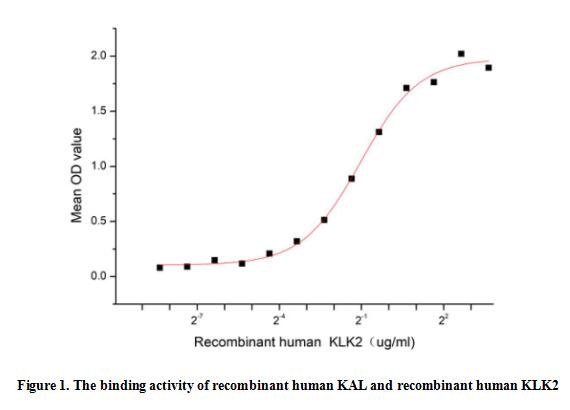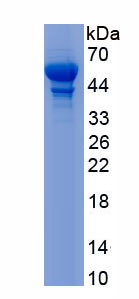Active Kallistatin (KAL)
SERPINA4; KLST; KST; PI4; Serpin Peptidase Inhibitor Clade A Member 4; Tissue Kallikrein Inhibitor; Kallikrein Binding Protein; Peptidase inhibitor 4
- Product No.APD392Hu01
- Organism SpeciesHomo sapiens (Human) Same name, Different species.
- Buffer FormulationPBS, pH7.4, containing 0.01% SKL, 5% Trehalose.
- Traits Freeze-dried powder
- Purity> 80%
- Isoelectric Point8.1
- ApplicationsCell culture; Activity Assays.
- DownloadInstruction Manual
- UOM 10µg50µg 200µg 1mg 5mg
- FOB
US$ 220
US$ 550
US$ 1100
US$ 3300
US$ 8250
For more details, please contact local distributors!
ACTIVITY TEST

Kallistatin (KAL), a member of serpin family, can Inhibit human amidolytic and kininogenase activities of tissue kallikrein. KAL is widely distributed in a variety of organs and body fluids and has biological effects such as anti-inflammatory, antioxidant stress, anti-angiogenesis and anti-tumor. Besides, Kallikrein 2 (KLK2) has been identified as an interactor of KAL, thus a functional binding ELISA assay was conducted to detect the interaction of recombinant human KAL and recombinant human KLK2. Briefly, KLK2 was diluted serially in PBS with 0.01% BSA (pH 7.4). Duplicate samples of 100 μl were then transferred to KAL-coated microtiter wells and incubated for 1h at 37℃. Wells were washed with PBST and incubated for 1h with anti-KLK2 pAb, then aspirated and washed 3 times. After incubation with HRP labelled secondary antibody for 1h at 37℃, wells were aspirated and washed 5 times. With the addition of substrate solution, wells were incubated 15-25 minutes at 37℃. Finally, add 50 µL stop solution to the wells and read at 450/630 nm immediately. When recombinant human KAL is immobilized at 2 ug/mL (100 uL/well), the concentration of KLK2 that produces 50% optimal binding response is found to be approximately 0.49 ug/mL.
USAGE
Reconstitute in 10mM PBS (pH7.4) to a concentration of 0.1-1.0 mg/mL. Do not vortex.
STORAGE
Avoid repeated freeze/thaw cycles. Store at 2-8°C for one month. Aliquot and store at -80°C for 12 months.
STABILITY
The thermal stability is described by the loss rate. The loss rate was determined by accelerated thermal degradation test, that is, incubate the protein at 37°C for 48h, and no obvious degradation and precipitation were observed. The loss rate is less than 5% within the expiration date under appropriate storage condition.
GIVEAWAYS
INCREMENT SERVICES
-
 BCA Protein Quantification Kit
BCA Protein Quantification Kit
-
 Molecular Mass Marker for Protein
Molecular Mass Marker for Protein
-
 Monoclonal Antibody Customized Service
Monoclonal Antibody Customized Service
-
 Polyclonal Antibody Customized Service
Polyclonal Antibody Customized Service
-
 Protein Activity Test Experiment Service
Protein Activity Test Experiment Service
-
 Electrophoretic Mobility Shift Assay (EMSA) Experiment Service
Electrophoretic Mobility Shift Assay (EMSA) Experiment Service
-
 Buffer
Buffer
-
 Lentivirus Packaging Experiment Service
Lentivirus Packaging Experiment Service
-
 Adenovirus Packaging Experiment Service
Adenovirus Packaging Experiment Service
-
 Real Time PCR Experimental Service
Real Time PCR Experimental Service
-
 Spike RBD Protein (S-RBD)
Spike RBD Protein (S-RBD)
-
 Protein G
Protein G
-
 Protein A
Protein A
| Catalog No. | Related products for research use of Homo sapiens (Human) Organism species | Applications (RESEARCH USE ONLY!) |
| APD392Hu01 | Active Kallistatin (KAL) | Cell culture; Activity Assays. |
| RPD392Hu01 | Recombinant Kallistatin (KAL) | Positive Control; Immunogen; SDS-PAGE; WB. |
| PAD392Hu01 | Polyclonal Antibody to Kallistatin (KAL) | WB; IHC; ICC; IP. |
| MAD392Hu21 | Monoclonal Antibody to Kallistatin (KAL) | WB; IHC; ICC; IP. |
| SED392Hu | ELISA Kit for Kallistatin (KAL) | Enzyme-linked immunosorbent assay for Antigen Detection. |
| LMD392Hu | Multiplex Assay Kit for Kallistatin (KAL) ,etc. by FLIA (Flow Luminescence Immunoassay) | FLIA Kit for Antigen Detection. |







